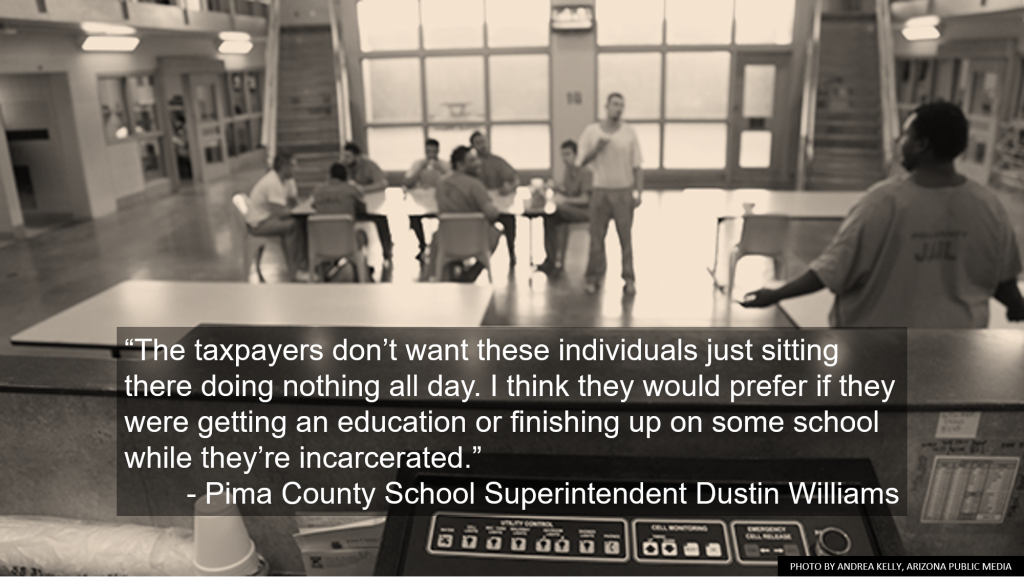
A new opinion from Arizona Attorney General Mark Brnovich is leaving dozens of young adults who are locked up in Pima County jail without the funding to help them complete a high school diploma.
– Arizona Daily Star, July 30, 2019
In a narrow and arguably unconstitutional legal opinion, Arizona’s Attorney General (AG) threatens a program to help Pima County jail inmates pursue their high school education. Pima County Schools Superintendent Dustin Williams denounced the opinion. “How in the world are we not educating probably the neediest kids and start to tackle this school-to-prison pipeline and start to tackle this recidivism that is out of control?” he asked Capital Media Services.
An aide to Attorney General Mark Brnovich defended the opinion, saying, “We follow what the law says, not what we want it to be or what we think it should be.” That sounds good, but the AG relies on a single statute in the face of contrary statutory language and the Arizona Constitution.
Brnovich relied on this statement from Arizona Revised Statute (ARS) § 15-913.01(A): “Each county that operates a county jail shall offer an education program to serve all prisoners who are under eighteen years of age and prisoners with disabilities who are age twenty-one or younger.” He says that excludes services for non-disabled prisoners who are older than 18, suggesting the legislature intended to eliminate their educational services while providing them to other students. The language is more likely a drafting error than expression of legislative intent. But it says what it says, and that’s enough for Brnovich, who wrote that statutory interpretation begins and ends “with the statute’s plain language.” The “plain language” is overridden by conflicting statutes and the Arizona Constitution.
State law requires a county that runs a jail to provide educational services. ARS § 15-913.01. The program can be in the form of an accommodation school, as in Pima County. The law defines accommodation schools as, among other things, “alternative education programs as provided in section 15-308, subsection B.” ARS § 15-308 refers to “alternative education programs as defined in section 15-796,” which provides “the modification of the school course of study and adoption of teaching methods, materials and techniques to provide educationally for those pupils in grades six through twelve who are unable to profit from the regular school course of study and environment.” Prisoners can’t “profit from the regular school course of study” because they’re locked up. The statute cited by Brnovich, the only one that denies educational services to non-disabled students aged 19 – 21, is an outlier, as illustrated by a similar statute immediately preceding it.
ARS § 15-913 applies to juvenile detention centers and includes language similar to ARS § 15-913.01, with a glaring exception: there is no similar age limitation. All pupils confined to juvenile detention centers are entitled to educational services up to age 21. But what if a juvenile detention center prisoner is transferred to a county jail? ARS § 15-913.01(B) states, “The county school superintendent shall develop policies and procedures for the transfer of educational records of any prisoner confined in a county jail who has been transferred from a juvenile detention center.” Any prisoner. Why would the legislature require the transfer of educational records unless they anticipate a continuation of services in the jail setting? Brnovich never addresses that.
The County argues that ARS § 15-821 requires accessibility to educational services for all jail inmates up to age 21. The statute reads, “Unless otherwise provided by article 1.1 of this chapter or by any other law, all schools shall admit children who are between the ages of six and twenty-one years.” Brnovich argues that 15-913.01 is an “other law” that triggers the “otherwise provided” language and limits state funding.
Brnovich never mentions the Arizona Constitution, which mandates a “general and uniform public school system” (Title 11, Article 1) and states, “The legislature shall provide for a system of common schools … which school shall be open to all pupils between the ages of six and twenty-one years” (Title 11, Article 6). The two provisions require a general and uniform public school system for all pupils between the ages of six and twenty-one years.
The statute Brnovich relies on violates the constitution by eliminating educational services for public-school students in county jails who constitutionally quality for them. “When a state statute conflicts with Arizona’s Constitution, the constitution must prevail.” Dobson v State, 309 P.3d 1289 at 1294 (2013). “The sovereign people speak in the language of their constitution. Their will expressed in the constitution is the will of the sovereign itself.” State v. Osborne, 14 Ariz. 185, 125 at 884. “(I)t would be absurd to say that the legislature, which is the creature of the people through their Constitution, could enact a law which would take precedence over constitutional provisions enacted by the people themselves,” wrote the Arizona Supreme Court in Windes v. Frohmiller, 3 P.2d 275 (Ariz. 1931), adding, “This court will not violate the people’s trust by attempting to subvert their Constitution to any legislative enactment.”
Substitute “Attorney General’s Opinion” for “legislative enactment,” because neither Brnovich nor the legislature can override the state constitution. Brnovich relied on the “plain language” of an outlier statute rather than the “plain language” of the Arizona Constitution. His opinion is flawed and the consequences will be costly.
Lack of funding doesn’t let Pima County off the hook. ARS § 15-821 says schools “shall admit children who are between the ages of six and twenty-one years.” It does not say “may” and the constitution invalidates the age limitation in § 15-913.01. The County must educate them, with or without state funding. Brnovich may have unilaterally – and unconstitutionally – imposed a tax on Pima County residents to pay for the education of young jail inmates the state won’t cover.
© 2019 by Mike Tully

Be First to Comment